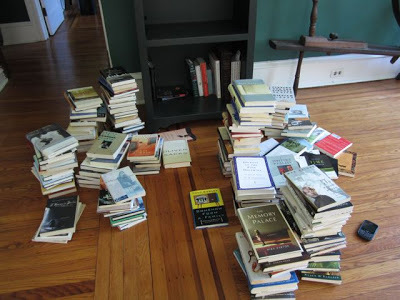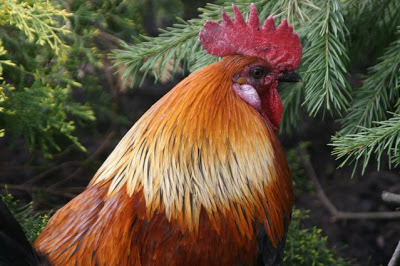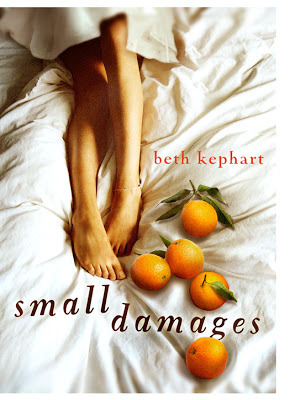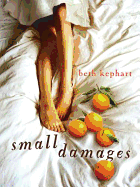Beth Kephart's Blog, page 185
May 20, 2012
A first brief glimpse of SMALL DAMAGES and thoughts on writing dialogue
A few weeks ago, my friend Susan Campbell Bartoletti (click here to read about how much I love Susan) asked if I might reflect on subtext in dialogue in video format for her Penn State students. Today, I'm posting my response here—thoughts on what makes dialogue tick. Susan asked that I read from own work, and so I did—choosing a passage from YOU ARE MY ONLY as well as one from SMALL DAMAGES. This constitutes my first reading of SMALL DAMAGES, which will be released in July, and which just received a starred PW review.




Published on May 20, 2012 09:55
The Lives of Others, an East Berlin film
As much research as I do for all of my books, I try to steer clear of any art (pure art, pure story) that might influence my storytelling until my own book is settled into place. With my Berlin novel now in the compassionate hands of Tamra Tuller at Philomel, I feel less constrained, more able to watch or read work set in the same zones of time and place. Last night, at my friend Annika's urging, I watched "The Lives of Others," a film that had been on my radar screen for quite some time.
The film is, as Annika had promised, compelling and necessary—an intense, provocative, ultimately beautiful look at the compressed lives of artists in Stasi-dominated East Berlin, beginning in 1984. Heroes and anti-heroes abound. The loveliness of the film, the heartbreaking part, is how rarely the characters conform to stereotype.
[image error]




Published on May 20, 2012 07:12
May 19, 2012
James Baldwin: An Interview
For ten minutes today I stopped. This interview with James Baldwin was my balm. Real writers don't turn their knowledge about writing into a spectacle or a lecture. They wonder out loud. They consider. That is what Baldwin does here.[image error]




Published on May 19, 2012 16:51
It's Called Living (and I plan to do more of it)

It has been six years since your last novel
was published, and I gather you weren’t writing for some of that time.
What were you doing? Jack Daniel’s and the “Today” show?
Living,
it’s called living. You might call it wasting time, but I just call it
living. Going bird hunting, reading books, watching the Red Sox, doing
things with my wife that we wouldn’t have time to do if I was writing a
book. There’s a whole lot to do once you can get out from under the yoke
of working.
— excerpted from "Richard Ford Is a Man Who Actually Listens," Andrew Goldman interview, New York Times[image error]




Published on May 19, 2012 08:15
May 18, 2012
The Long Goodbye/Meghan O'Rourke: Reflections

One expects from poets deeply lyrical, language-invested
memoirs, especially when the topic is grief, or at least I do. But in The Long Goodbye, this very personal but also
deliberately universal story about losing her own mother to cancer at the age
of fifty-five, the poet Meghan O’Rourke chooses language that is almost stark, rarely
buoyed by metaphor, and frequently amplified by the words of experts, to
retrace her journey through loss. O’Rourke
wasn’t prepared for her mother’s absence.
Can anyone be? She has lost
something, and she continues to look—avidly, stonily, ragingly,
insistently. She reads the
literature. She talks with friends. She risks bad behavior simply to find the prickle of living again.
But O'Rourke, like all of us, has to live
her grief alone, and the worst thing about grief, in the end, is this: there is
no cure. When someone we have loved is gone, we cannot get them back. As one who lost her own mother a few years ago, who watched her life force peel away, I find these words, toward the book’s
close, to be powerful and true—the poet working alongside the daughter here,
the facts lifting toward metaphor:
The bond between a mother and child is so unlike any other
that it is categorically irreplaceable.
Unmothered is not a word in my
dictionary, but I often find myself thinking it should be. The “real” word most like it—it never
escapes me—is unmoored. The irreplaceability is what becomes
stronger—and stranger—as the months pass:
Am I really she who has woken up again without a mother? Yes, I am. Some nights I still lie awake, nerves
jangled, in the velvet dark, staring out the window, listening to the cars pass
by like echoes of other lives lived, my breath shallow, my toes cold, my mind
drifting in the shallows and currents of the past, like a child wading in a
stream.
[image error]




Published on May 18, 2012 07:22
May 17, 2012
I think I'm making progress on HANDLING THE TRUTH until ...

I take all of those books down from the shelf (memoirs, most of them, or theories about them) and realize: I haven't even scratched the surface. So much to say. So much to re-read. So much to ponder.
One day at a time, I tell my tired soul.[image error]




Published on May 17, 2012 08:52
The Liar's Club/Mary Karr: Reflections

First published in 1995, The Liar's Club was nothing short of a ricochet memoir—an event of a book, a story told with such lacerating equanimity and devastating particularity that anyone who knew memoir, loved memoir, celebrated memoir had soon made the book their own.
Except for me. I chose to wait. I knew, instinctively, that if I read this book too soon I might not have room to define the memoir form for myself, to make my own books in my own virginal book-making way. I had to glance away before I could glance toward.
Over these past three days, I have done little but read, admire, and privately exclaim over The Liar's Club. Mary Karr grows up living the hardest possible scrabble of a life, in a
poisonous town, with a Nervous mother, with a daddy who excels at big,
foggy stories among menfolk at The Liar's Club, with a grandmother's whose dying from
cancer is an unrelieved grotesquerie, and whose fake leg with its fake shoe terrifies a child who is herself ornery as anything, except when nobody's looking. Karr knows when to use the past tense and when to wing at us with the present. She understands that in a story this full of snakes and madness, accidents and fires, the crawl of sugar ants up the arm of a dying woman, she will only gain our trust by saying, sometimes, that maybe her memory has been fudged, or maybe her sister recalls it better, or maybe she'll just have to leave that part blank because her thoughts went blank at that particularly crucial moment. People write about The Liar's Club, and they write about its funniness, its love, and that's quite a trick, if you ask me. It's quite a trick to look back on what Mary Karr looks back on—poverty, abuse, hurting of every measure, danger—and come up with a story written not to tattle on what was done, not to complain, not to suggest that the author had it hard up, See?, but to try to understand what breed of sadness, heartache, or shatter might lie at the bottom of her mother's supreme but never evil oddness.
And look. Of course I'm a sucker for gorgeous prose. It's there, on every page.
That morning, when I woke up lying under the back slant of the windshield, the world smelled not unlike a wicked fart in a close room. I opened my eyes. In the fields of gator grass, you could see the ghostly outline of oil rigs bucking in slow motion. They always reminded me of rodeo riders, or of some huge servant creatures rising up and bowing down to nothing in particular. In the distance, giant towers rose from each refinery, with flames that turned every night's sky an odd, acid-green color. The first time I saw a glow-in-the-dark rosary, it reminded me of those five-story torches that circled the town at night. Then there were the white oil-storage tanks, miles of them, like the abandoned eggs of some terrible prehistoric insect.
[image error]




Published on May 17, 2012 05:03
May 16, 2012
Joining Twitter

On this day of enforced rest (doctor's orders following an unpretty breakdown of all still-working parts), I am spending idle time doing fun things like finishing Mary Karr's The Liar's Club and, yes, joining Twitter.
Come be part of my Tweet world. Help me understand howit works. Make me smarter when people say "hashtag." I need to be smarter when people say "hashtag." And also "trending."
Here I am (I think this is right). I have a grand total of three tweets and a handful of very fine friends. Leave it to Melissa Sarno to find me first!




Published on May 16, 2012 07:18
The Publishing Perspectives Profile (In anticipation of the Children's Book Conference)

Poor Dennis Abrams of Publishing Perspectives! He was given the task of interviewing me, and it was one of those days when I was talking too fast about, well, everything. That Dennis was able to create this beautiful profile for Publishing Perspectives says much about his talent for deep listening and fine cohesion. I am grateful, and I am so looking forward to the Publishing Perspectives Children's Book Conference, to be held on May 31st at the Scholastic Headquarters in New York City, where I'll be joining Peter Brown, John Rocco, and Raina Telgemeier on a panel Dennis moderates. Earlier in the day, conference participants will meet Pamela Paul, Jenny Brown, Roger Sutton, David Levithan, Ken Wright, Rosemary Stimola, and Erica Rand Silverman, among others.
I hope to find some of you there. And, again, thank you, Dennis.[image error]




Published on May 16, 2012 03:23
May 15, 2012
A Star from Publishers Weekly for SMALL DAMAGES

The beautiful, wise, wonderful, and ever-dear Tamra Tuller just called with the news. SMALL DAMAGES has received a star from Publishers Weekly.
When you have a house this fantastic behind you, when you have a Tamra Tuller in your corner, you desperately don't want to let anyone down.
I am breathing easier. Thank you, Publishers Weekly.
 Small Damages
Small DamagesBeth Kephart. Philomel, $17.99 (304p) ISBN 978-0-399-25748-3

As Kenzie’s senior year of high school begins, her beloved father dies
suddenly. Her mother’s coping mechanisms—pack his things, start a
business, join Match .com—push Kenzie closer to her friend Kevin, and by
spring, she’s pregnant. Kenzie’s mother’s response (which feels more
1896 than 1996, when the story is set) is to arrange for Kenzie to move
to a bull farm in southern Spain, where she’ll work until the baby is
born and given up for adoption. The wrinkle in this soulless plan is
that Kenzie is conflicted; her story is written as a tender, honest
letter to her unborn child. Kenzie arrives in Spain sullen and
resentful—she’s chopping onions with Estela, the farm’s cook, while her
friends are at the Jersey Shore—and the distance brings her predicament
into sharp relief. Estela is a better mother than her biological one;
Esteban, the teen in charge of horses, a more standup guy than
Yale-bound Kevin. This beautifully written “summer of transformation”
story will have readers feeling as torn about Kenzie’s choice as she is.
Ages 14–up. Agent: Amy Rennert, the Amy Rennert Agency. (July)




Published on May 15, 2012 06:47



